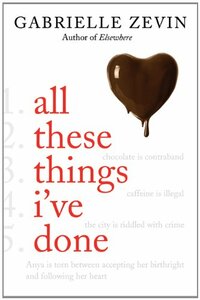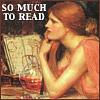Take a photo of a barcode or cover
The book is made to (physically) look like a chocolate bar under the dust jacket which features a bleeding chocolate heart. How am I not going to love this?
ARC from BEA
Overall I really liked this book. Anya was a great character and I loved her family and Win. I would have liked to have more information about the world she lived in. She mentioned different things but it wasn't enough to really draw me into the book. I am hoping for a sequel because it feels like the next book would really bring in Anya's extended family.
Overall I really liked this book. Anya was a great character and I loved her family and Win. I would have liked to have more information about the world she lived in. She mentioned different things but it wasn't enough to really draw me into the book. I am hoping for a sequel because it feels like the next book would really bring in Anya's extended family.
hopeful
lighthearted
fast-paced
Plot or Character Driven:
A mix
Strong character development:
Yes
Loveable characters:
Yes
Diverse cast of characters:
No
Flaws of characters a main focus:
No
I really liked this one. It was memorable enough that even though I stopped reading it for a couple weeks during the holidays, I was able to pick it right back up again and remember everything I had already read.
The narrative was different and fun, and I really liked the main character. I'm looking forward to reading more in the series.
The narrative was different and fun, and I really liked the main character. I'm looking forward to reading more in the series.
medium-paced
Plot or Character Driven:
Plot
Strong character development:
No
Loveable characters:
Complicated
Diverse cast of characters:
No
Flaws of characters a main focus:
Yes
I'll admit that this was fun to read, and that the echoes of the Prohibition era was done quite well, but it was the worldbuilding that really killed it for me. I mean, apart from the absurd notion that coffee and chocolate are banned, I can't understand why those two items are banned when alcohol is legal, even for minors. A lot of things just don't make sense in terms of the worldbuilding. If anything, it felt like it was dystopian for the sake of being a dystopian. There was nothing remarkable about this book, and it obviously jumped onto the dystopian bandwagon.
The romance was a bit iffy. Anya did a complete about-face in terms of her feelings for Win. One moment she was like, "Oh, I'm not interested. He's not my type", and the next, she's planning on having sex with him (which, if you've read the book, and know that she's a Catholic, is off-character).
I won't even touch up on the summary on the back of the book: "Anya will have to choose between love and loyalty, knowing that whatever she decides will have shattering consequences: heartbreak or a gangland war that will tear the city apart." Really? That's her decision? It seems like a bit of a no-brainer to me. And considering that she wasn't even remotely interested in Win when she was forbidden to date him, I don't see why it should have been that big a deal.
The story was pretty awesome, but when the unecessary romance came into play in the second half of the novel, all trace of plot scampered away, only revealing its ugly face in the last fifty or so pages. Not impressive.
Another positive aspect that I have to comment on is the voice and readability. The voice was very likeable, and easy to read. It made for a quick, light read, perfect for a day in the sun.
The romance was a bit iffy. Anya did a complete about-face in terms of her feelings for Win. One moment she was like, "Oh, I'm not interested. He's not my type", and the next, she's planning on having sex with him (which, if you've read the book, and know that she's a Catholic, is off-character).
I won't even touch up on the summary on the back of the book: "Anya will have to choose between love and loyalty, knowing that whatever she decides will have shattering consequences: heartbreak or a gangland war that will tear the city apart." Really? That's her decision? It seems like a bit of a no-brainer to me. And considering that she wasn't even remotely interested in Win when she was forbidden to date him, I don't see why it should have been that big a deal.
The story was pretty awesome, but when the unecessary romance came into play in the second half of the novel, all trace of plot scampered away, only revealing its ugly face in the last fifty or so pages. Not impressive.
Another positive aspect that I have to comment on is the voice and readability. The voice was very likeable, and easy to read. It made for a quick, light read, perfect for a day in the sun.
I really liked the first half of this book. Then i felt like it tapered down. I don't know if is because I felt Ana's life was too hard and she had to sacrifice too much, or the story just got away from me. I hope there will be a second book, if so i will read it hoping for a more satisfying ending.
I got this as an ARC from the publisher. Both Natalie and I read it and both loved it. YA, in that it is mostly about a 16 year old girl, but better writing than most YA. Interesting story about a future where chocolate is illegal and caffeine the most sought-after street drug.
I was surprised to encounter reviews that scoffed at Zevin's futuristic premise that coffee and chocolate have been made illegal, and specifically at the way the characters in the book react to them as if they were in fact dangerous -- like how users are described as getting "high" or "wasted" after ingesting these substances, which of course we generally consider to be harmless. Of course, these reviewers are missing the point that the way people perceive the dangers of controlled substances, and even the ways we personally experience them if we try them, are arguably as influenced by our expectations (set by how society tells us they will affect us) as by their actual, physiological effects on our bodies. (For example, see also persistent beliefs that ingesting sugar makes children "hyperactive" despite the fact that scientific studies have never found any evidence of a causal link.) That said, I couldn't help but feel that Zevin's premise is validated by this article about "caffeine intoxication" in the DSM-V: http://www.huffingtonpost.com/2013/05/29/dsm-5-caffeine-intoxication-coffee_n_3353202.html





